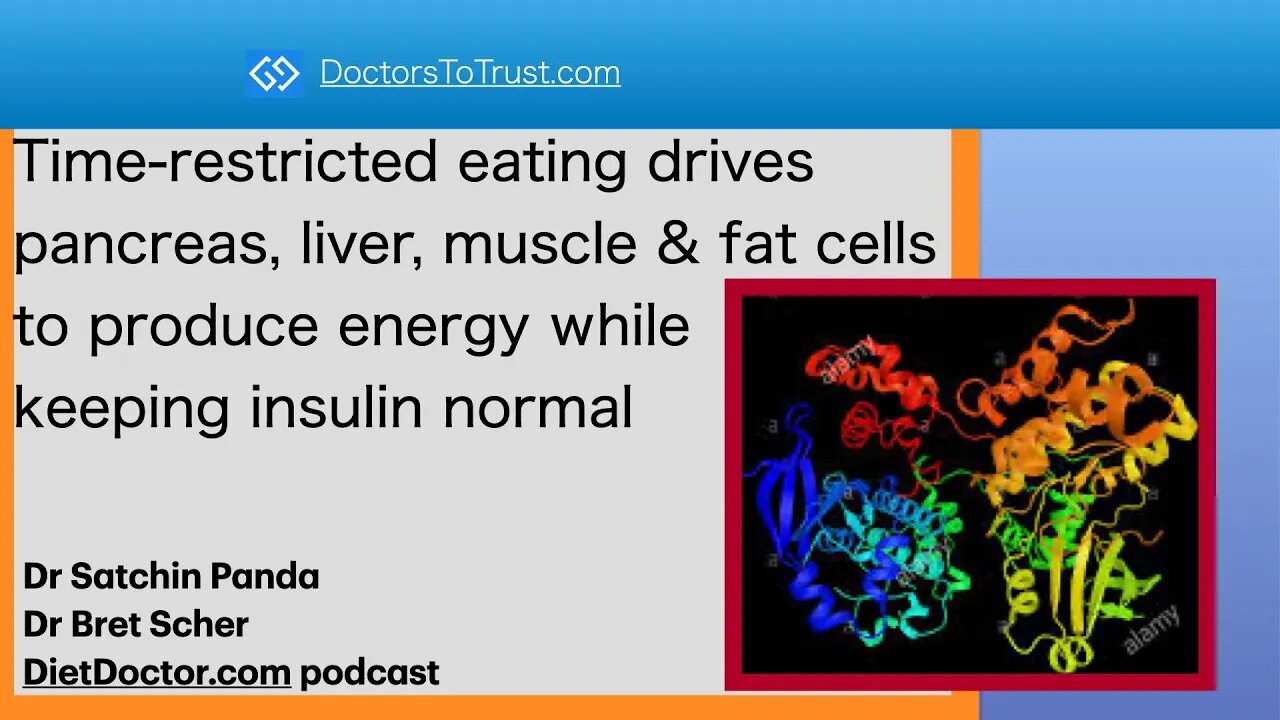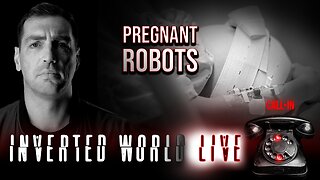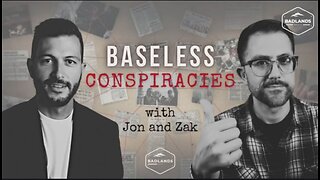Premium Only Content

DietDoctor3: Time-restricted eating: pancreas, liver, muscle, fat produce energy; keeps insulin low
DoctorsToTrust.com
presents episode 249:
Dr Satchin Panda
with
Dr Bret Scher
The DietDoctor.com
Asking people to fast or to count calories, it is very stressful...
-people don't enjoy that
-but, eating within a 10 hour window is enjoyable
~that is why people stuck with it
Why does time-restricted eating work?
-we know what improves health: example Metformin
-mimics fasting
-acts on AMP kinase
-triggers fat oxidation & other things
AMP kinase
AMP activated protein kinase:
-an enzyme that plays a role in cellular energy homeostasis
-activates glucose and fatty acid oxidation when
cellular energy is low
When animals do time-restricted eating...
-pancreas get enough rest to prime the cells to:
~produce just enough insulin when eating
~does NOT produce excess insulin during fasting
~fasting insulin actually drops
When animals do time-restricted eating...
-liver, when we fast, produces some glucose to fuel brain..
-but in type 2 diabetes, this production,
which should only happen when fasting,
happens all the time
"as if circadian rhythm & glucose
production is non-functional"
-contributes to increased glucose
When mice do time-restricted eating...
-this process, called gluconeogensis,
shuts down during eating period
"for half the day, the liver is not
producing excess glucose"
-glucose levels remain normal
gluconeogensis: glucose is made by breaking down
protein in the muscle...
-if for half the day, muscle protein is not being broken down:
-muscle must be getting healthier
"in at least half of the mouse
experiments, muscle mass increases
under time-restricted eating"
-functional muscle mass!
We find the same in fat tissues...
-during time-restricted eating, there is enough energy deficit:
-fat tissue now breaks down fat needed when we fast
-then comes to liver, breaks down into ketone bodies for fuel
These processes are all interlinked...
-for fat breakdown to happen,
-excess cholesterol in liver must be broken down
-circadian clock in liver becomes stronger
-one other clock protein breaks down
cholesterol into bile acids
-some bile acids go to fat cells
-tells them liver needs fat to
create ketones
It is not one thing that happens during time-restricted eating...
-5 or 6 things that we know for now
-that list is continuing to grow
-
 26:39
26:39
Doctors To Trust
1 year agoBEN BIKMAN | FULL SET: key points! KETONES: brains prefer; cuts INFLAMMATION
1.59K2 -
 1:43:12
1:43:12
The Michelle Moore Show
1 day ago'Trump Cracks Down On Immigration Through HUD, Churches Are Combat Ineffective, ChatGPT...Mechanism To Control People, Pam Bondi and Susie Wiles...Who Controls Access To Trump?' Mark Taylor: The Michelle Moore Show (Aug 18, 2025)
18.2K42 -
 LIVE
LIVE
Lofi Girl
2 years agoSynthwave Radio 🌌 - beats to chill/game to
204 watching -
 2:21:40
2:21:40
FreshandFit
6 hours agoOF Bimbo Gets TRIGGERED Over Systemic Racism! HEATED DEBATE
81.5K65 -
 2:03:03
2:03:03
Inverted World Live
10 hours agoPregnant Robots | Ep. 93
112K22 -
 LIVE
LIVE
Akademiks
6 hours agoDrake vs Roc Nation! Tory Lanez argues for new Trial! Bloodhound Q50 dodged 60 shots.
1,490 watching -
 1:58:16
1:58:16
Badlands Media
22 hours agoBaseless Conspiracies Ep. 146: GART Deadwood Highlights
77.8K22 -
 4:55:43
4:55:43
Drew Hernandez
13 hours agoTRUMP SECURES SETTING MEET BETWEEN PUTIN & ZELENSKYY
23.9K10 -
 5:06:26
5:06:26
SpartakusLIVE
10 hours agoSpartan HERO here to MOTIVATE the MASSES
56.3K2 -
 1:27:19
1:27:19
Badlands Media
22 hours agoCulture of Change Ep. 117: DARPA, Downloads & the Roots of the Narrative
65.3K8